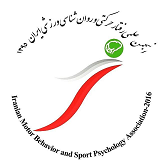Tue, Dec 23, 2025
[Archive]
Volume 2, Issue 3 (8-2020)
IJMCL 2020, 2(3): 41-51 |
Back to browse issues page
Download citation:
BibTeX | RIS | EndNote | Medlars | ProCite | Reference Manager | RefWorks
Send citation to:



BibTeX | RIS | EndNote | Medlars | ProCite | Reference Manager | RefWorks
Send citation to:
Maleki M. (2020). Relationship between Perfectionism and Skill Performance in Adolescent Futsal Players. IJMCL. 2(3), 41-51. doi:10.29252/ijmcl.2.3.41
URL: http://ijmcl.com/article-1-58-en.html
URL: http://ijmcl.com/article-1-58-en.html
Department of Sport Sciences, University of Kurdistan, Sanandaj, Iran , mo.maleki@uok.ac.ir
Abstract: (6514 Views)
Background: Adolescent's perfectionism relates primarily to stress symptoms. Relationship between aspects of perfectionism and sports performance in no-stress training accompanied by inconsistent results.
Objective: The purpose of the present study was to investigate how different aspects of perfectionism predict futsal skill performances during stressful training in the adolescent.
Methods: Participants were 101 adolescent futsal players. They completed perfectionism inventory, then performed a futsal skill during three blocks of four trials. Two indices took into account: time and performance.
Results: There was a significant relationship between positive perfectionism and performance during blocks 1 and 3 when negative perfectionism was considered. A significant positive relationship between negative perfectionism was observed with both time and performance during block 3. Also, a significant positive correlation in terms of the interaction between high positive and high negative perfectionism with the performance during block 3 was found.
Conclusions: The findings suggest that positive perfectionism in athletes during training was correlated with high levels of performance, but when crossing blocks, that relationship removed. Also, after observing other's performance, performance in individuals with high negative perfectionism during consecutive trials improved. When the interaction between positive and negative perfectionism was considered to predict sports performance, performance in individuals with high positive perfectionism during stressful training impaired.
Objective: The purpose of the present study was to investigate how different aspects of perfectionism predict futsal skill performances during stressful training in the adolescent.
Methods: Participants were 101 adolescent futsal players. They completed perfectionism inventory, then performed a futsal skill during three blocks of four trials. Two indices took into account: time and performance.
Results: There was a significant relationship between positive perfectionism and performance during blocks 1 and 3 when negative perfectionism was considered. A significant positive relationship between negative perfectionism was observed with both time and performance during block 3. Also, a significant positive correlation in terms of the interaction between high positive and high negative perfectionism with the performance during block 3 was found.
Conclusions: The findings suggest that positive perfectionism in athletes during training was correlated with high levels of performance, but when crossing blocks, that relationship removed. Also, after observing other's performance, performance in individuals with high negative perfectionism during consecutive trials improved. When the interaction between positive and negative perfectionism was considered to predict sports performance, performance in individuals with high positive perfectionism during stressful training impaired.
Type of Study: Original Article |
Subject:
1-3. Sport Psychology
Received: 2020/05/3 | Accepted: 2020/07/12
Received: 2020/05/3 | Accepted: 2020/07/12
References
1. Accordino, D. B., Accordino, M. P., & Slaney, R. B. (2000). An investigation of perfectionism, mental health, achievement, and achievement motivation in adolescents. Psychology in the Schools, 37, 535-545.
https://doi.org/10.1002/1520-6807(200011)37:6<535::AID-PITS6>3.0.CO;2-O [DOI:10.1002/1520-6807(200011)37:63.0.CO;2-O]
2. Alizadeh Pahlavani, H., Alam, S., Monazami, M., & Bahmaei, S. (2013). The relationship of positive and negative perfectionism with competitive state anxiety in adolescent handball players. Annals of Biological Research, 4, 5, 216-221.
3. Anshel, M. H., & Mansouri, H. (2005). Influences of perfectionism on motor performance, affect, and causal attributions in response to critical information feedback. Journal of Sport Behavior, 28, 99-124.
4. Bieling, P. J., Israeli, A., Smith, J., & Antony, M. M. (2003). Making the grade: The behavioral consequences of perfectionism in the classroom. Personality and Individual Differences, 35, 163-178. [DOI:10.1016/S0191-8869(02)00173-3]
5. Covington, M. V. (1992). Making the grade: A self-worth perspective on motivation and school reform. New York: Cambridge University Press. [DOI:10.1017/CBO9781139173582]
6. Dunkley, D. M., Zuroff, D. C., & Blankstein, K. R. (2003). Self-critical perfectionism and daily affect: Dispositional and situational influences on stress and coping. Journal of Personality and Social Psychology, 84, 234-252. [DOI:10.1037/0022-3514.84.1.234]
7. Einstein, D. A., Lovibond, P. F., & Gaston, J. E. (2000). Relationship between perfectionism and emotional symptoms in an adolescent sample. Australian Journal of Psychology, 52, 89-93. [DOI:10.1080/00049530008255373]
8. Elliot, A. J., & Conroy, D. E. (2005). Beyond the dichotomous model of achievement goals in sport and exercise psychology. Sport and Exercise Psychology Review, 1, 17-25.
9. Enns, M. W., & Cox, B. J. (2002). The nature and assessment of perfectionism: A critical analysis. In G. L. Flett, & P. L. Hewitt (Eds.), Perfectionism: Theory, research, and treatment (pp. 33-62). Washington, DC: American Psychological Association. [DOI:10.1037/10458-002]
10. Flett, G. L., & Hewitt, P. L. (2002). Perfectionism and maladjustment: An overview of theoretical, definitional, and treatment issues. In G. L. Flett, & P. L. Hewitt (Eds.), Perfectionism: Theory, research, and treatment (pp. 5-13). Washington, DC: American Psychological Association. [DOI:10.1037/10458-001]
11. Flett, G. L., & Hewitt, P. L. (2005). The perils of perfectionism in sports and exercise. Current Directions in Psychological Science, 14, 14-18. [DOI:10.1111/j.0963-7214.2005.00326.x]
12. Flett, G. L., & Hewitt, P. L. (2006). Positive versus negative perfectionism in psychopathology: A comment on Slade and Owens's dual process model. Behavior Modification, 30, 472-495. [DOI:10.1177/0145445506288026]
13. Frost, R. O., Heimberg, R. G., Holt, C. S., Mattia, J. I., & Neubauer, A. L. (1993). A comparison of two measures of perfectionism. Personality and Individual Differences, 14, 119-126. [DOI:10.1016/0191-8869(93)90181-2]
14. Gaudreau, P., & Thompson, A. (2010). Testing a 2×2 model of dispositional perfectionism. Personality and Individual Differences, 48, 532-537. Doi: 10.1016/j.paid.2009.11.031 [DOI:10.1016/j.paid.2009.11.031]
15. Goyen, M. J., & Anshel, M. H. (1998). Sources of acute competitive stress and use of coping strategies as a function of age and gender. Journal of Applied Developmental Psychology, 19, 469-486. [DOI:10.1016/S0193-3973(99)80051-3]
16. Hall, H. K., Kerr, A. W., Kozub, S. A., & Finnie, S. B. (2007). Motivational antecedents of obligatory exercise: The influence of achievement goals and multidimensional perfectionism. Psychology of Sport and Exercise, 8, 297-316. [DOI:10.1016/j.psychsport.2006.04.007]
17. Hewitt, P. L., Caelian, C. F., Flett, G. L., Sherry, S. B., Collins, L., & Flynn, C. A. (2002). Perfectionism in children: associations with depression, anxiety, and anger. Personality and Individual Differences, 32, 1049-1061. [DOI:10.1016/S0191-8869(01)00109-X]
18. Hiebert, B. (1988). Controlling stress: A conceptual update. Canadian Journal of Councelling, 22, 226-241.
19. Hill, A. P., Hall, H. K., Appleton, P. R., & Kozub, S. A. (2008). Perfectioniam and burnout in junior elite soccer players: The mediating influence of unconditional self-acceptance. Psychology of Sport and Exercise, 9, 630-644. [DOI:10.1016/j.psychsport.2007.09.004]
20. Magill, R. A. (2011). Motor Learning and Control; Concepts and Applications, Mc Graw Hill, 336-340.
21. Rice, K. G., & Ashby, J. S. (2007). An efficient method for classifying perfectionists. Journal of Counseling Psychology, 54, 72-85. doi: 10.1037/0022-0167.54.1.72 [DOI:10.1037/0022-0167.54.1.72]
22. Rice, K. G., & Slaney, R. B. (2002). Clusters of perfectionists: Two studies of emotional adjustment and academic achievement. Measurement and Evaluation in Counseling and Development, 35, 35-48. [DOI:10.1080/07481756.2002.12069046]
23. Sellars, P. A., Evans, L. & Thomas, O. (2016). The Effects of Perfectionism in Elite Sport:
24. Experiences of Unhealthy Perfectionists. The Sport Psychologist, 30, 219-230. Doi: 10.1123/tsp.2014-0072 [DOI:10.1123/tsp.2014-0072]
25. Stoeber, J. (2012). Perfectionism and performance. In S. M. Murphy (Ed.), The Oxford handbook of sport and performance psychology (pp. 294-306). New York: Oxford University Press. [DOI:10.1093/oxfordhb/9780199731763.013.0015]
26. Stoeber, J., & Becker, C. (2008). Perfectionism, achievement motives, and attribution of success and failure in female soccer players. International Journal of Psychology, 43 (6), 980-987. [DOI:10.1080/00207590701403850]
27. Stoeber, J., & Otto, K. (2006). Positive conceptions of perfectionism: Approaches, evidence, challenges. Personality and Social Psychology Review, 10, 295-319. [DOI:10.1207/s15327957pspr1004_2]
28. Stoeber, J., & Rambow, A. (2007). Perfectionism in adolescent school students: Relations with motivation, achievement, and well-being. Personality and Individual Differences, 42, 1379-1389. [DOI:10.1016/j.paid.2006.10.015]
29. Stoeber, J., Stoll, O., Salmi, O., & Tiikkaja, J. (2008). Perfectionism and achievement goals in young Finnish ice-hockey players aspiring to make the Under-16 national team. Journal of Sport Sciences, 1-10, iFirst article. [DOI:10.1080/02640410802448749]
30. Stoeber, J., Uphill, M. A., & Hotham, S. (2009). Predicting race performance in triathlon: The role of perfectionism, achievement goals, and personal goal setting. Journal of Sport and Exercise Psychology, 31, 2, 211-245. [DOI:10.1123/jsep.31.2.211]
31. Stoll, O., Lau, A., & Stoeber, J. (2008). Perfectionism and performance in a new basketball training task: Does striving for perfection enhance or undermine performance. Psychology of Sport and Exercise, 9, 620-629. Doi: 10.1016/j.psychsport.2007.10.001 [DOI:10.1016/j.psychsport.2007.10.001]
32. Williams, A. M., & Hodges, N. J. (2005). Practice, instruction and skill acquisition in soccer: challenging tradition. Journal of Sports Sciences, 23, 6, 637-650. [DOI:10.1080/02640410400021328]
Send email to the article author
| Rights and Permissions | |
 |
This work is licensed under Attribution 4.0 International (CC BY 4.0). |












